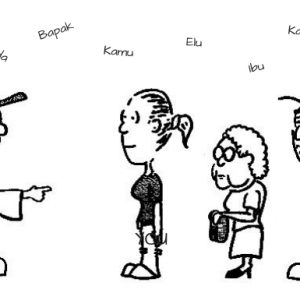Last updated on January 25, 2024
Nobody Speaks Indonesian??
When I talk to people about studying Indonesian in Jakarta, one of the most common responses is something like: “You know, what they teach you in the classroom is totally different from what you hear on the streets!” Talking with some people, you might come away with the impression that learning formal Indonesian is a complete waste of time, as if it is a totally different language compared to what people actually speak. One writer even goes so far as to say that nobody speaks Indonesian!
There are around 200 million people that speak Indonesian. Naturally, they don’t all speak exactly the same way. This is pretty normal for languages spoken by this many people. Spanish from Spain (Castellano) has different pronunciations and vocabulary from Spanish spoken in Latin American countries. My Brazilian Portuguese-speaking friend couldn’t understand the Portuguese spoken in Portugal when he first arrived there.
Many Types of English
And don’t forget about English! We are so used to hearing both American and British ways of speaking that we can overlook how different the sounds are. We can also easily overlook native English speakers in other countries like Jamaica, India and Singapore. If you’re not from those areas, you might have some difficulty understanding them on first encounter.
So it’s no surprise that there are many ways of speaking Indonesian, for example, Jakartan Indonesian, Papuan Malay and Riau Indonesian. In some ways, there are fewer differences between these varieties than between British and American English. For example, there are major pronunciation differences between American and British English, while the different types of Indonesian all use basically the same sounds.
On the other hand, travelling from one region to another in Indonesia, you are likely to encounter words that you have not heard before. If those are common words, like the word for “no” or a pronoun, then at first it will seem nearly impossible to understand what is being said. It might feel like a completely different language. However, from a linguistic perspective, changing a few words, dropping a prefix, or pronouncing vowels differently are all very minor changes.
What is Formal Indonesian?
Formal Indonesian is not just one variety among many. It is a standardized variety. In this way, it is similar to Standard German. Germany has hundreds of “dialects” depending on how you count. They are called dialects, but some of them are so different that someone who speaks a dialect from the southern part of the country might not understand someone speaking a dialect from the northern part. But they all learn standard German at school. This allows consistency in the language for official uses like government and education. In the same way, Indonesian is a standardized language variety that is essential for government, trade and education.
Despite the fact that formal Indonesian is not used “in the streets” of Jakarta, it is still a useful variety to study. For one, there are some contexts where using formal Indonesian is the norm. If you are working in an office, addressing a government official or speaking to a group, using standard Indonesian prevents you from sounding too informal, and potentially even rude.
It’s also useful to know standard Indonesian when travelling around the country. If you only speak Jakartan Indonesian, most people will understand you, because they’ve heard that variety on TV. But they’ll also know you are from the city. If you use the standard Indonesian that everyone studies in school, you might seem more approachable and easier to understand.
Further resources on Sociolinguistics:
Beginner:
A video by The Ling Space on Sociolinguistics and Dialects.
Intermediate:
A video by NativLang on Languages, Dialects and Registers.
Advanced:
Chambers, J.K. and Peter Trudgill. 1998 [1980]. Dialectology. Cambridge University Press.
About the author: As a linguist, Joseph Lovestrand is mostly interested in studying indigenous languages, and seeing what they have to tell us about how we communicate, think and live. His research began in Africa. He lived for a year in Chad, studying the Barayin language in order to help them establish their first ever literacy program. He also spent four years working in Cameroon where he managed projects supporting indigenous language communities and did field research on the Nyokon language. His most recent linguistic work has been in Indonesia, where he has consulted on a literacy program for the Kodi language in Sumba. Read more at: www.josephlovestrand.com

